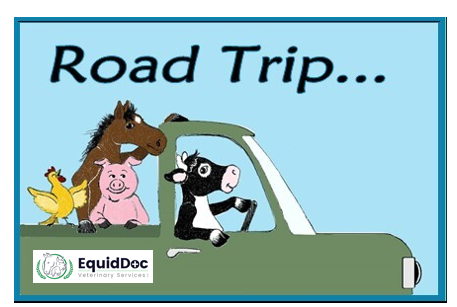When transporting any animal over state lines, it is important to have all documentation completed to ensure a pleasant trip!
What documentation is required to transport my animals over state lines?
All horses, sheep, goats, llamas, and alpacas must have a health certificate to be transported over state lines. If you are stopped while transporting animals over state lines, you may be required to show a completed health certificate.
In addition to a health certificate, horses should also have a current negative Coggins (EIA) test.
What is a Health Certificate?
A health certificate (also known as a CVI) serves a much bigger purpose than permitting you to transport your animal over state lines. The CVI plays a vital role in preventing the transmission of infectious diseases and the tracking of animals in case of a disease outbreak. The CVI, filled out following a veterinary exam, is meant to ensure that your animal has a clean bill of health. The veterinarian will inspect your animal for signs of contagious or infectious disease, notably respiratory or skin ailments. The veterinarian will also take your animal’s temperature at the time of the exam, and it will be recorded on the CVI. CVIs are good for 30 days from the time of the exam and you will be able to use that certificate to transport your animal to the destination listed on the certificate.
What information is needed for a health certificate?
- Current address of where the animal is stabled
- The recipients address & phone number
- The destination of the animal
- The carrier’s address and phone number
- The date of departure
What vaccines are required for travel over state lines?
Each state has different requirements for vaccines. It is important to research each state’s requirements before departure, to ensure your animal is guaranteed entry and is protected.
If you have questions or concerns about transporting your animals over state lines, please feel free to call EquidDoc at 508-885-4205 or email office@equiddocvet.com and we can help you make safe choices for you and your animals.


